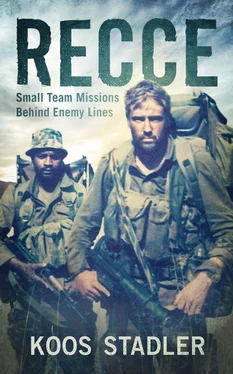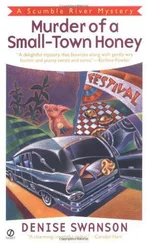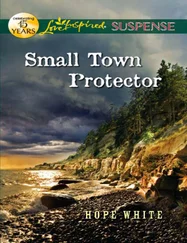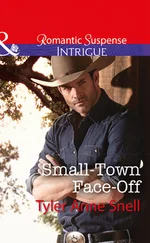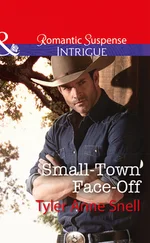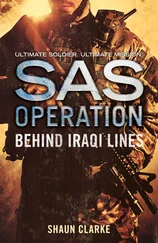A further addition to the course was exposure to custom-made demolition charges designed and manufactured by EMLC, the highly specialised (and later controversial) engineering company that worked exclusively on devices and equipment used in special operations. [9] EMLC, the Afrikaans acronym for “electrical, mechanical, agricultural and chemical engineering consultants” (Elektriese, Meganiese, Landboukundige en Chemiese ingenieurskonsultante), became highly controversial due to its link with the Civil Cooperation Bureau (CCB) and allegations that it had manufactured different kinds of deadly devices to support the apartheid regime.
The EMLC array of charges included various initiation devices, ranging from time switches to light-sensitive and anti-tilt mechanisms. We were also exposed to different forms of explosives, such as the highly effective PE4 and PE9, and to a liquid explosive called “Slurry”, which could be poured into confined spaces and turned solid when exposed to air. I would use many of these devices and explosives extensively during small team deployments later in my career.
Bushcraft, Tracking and Survival
The day finally arrived when we deployed to Fort Doppies, on the banks of the Kwando River in the Caprivi Strip, for the final phase of our training. The nine-month training cycle would be concluded with two courses – Survival and Minor Tactics. The nine remaining students, plus two guys who had joined us from previous selection courses, flew by C-130 from Waterkloof Air Force Base to Mpacha in the Eastern Caprivi.
Ray Godbeer, a seasoned operator from the erstwhile Rhodesian Selous Scouts, presented the Survival course. To our surprise, on the first day our clothes and equipment were taken away, leaving us with only PT shorts, T-shirt, a cap and a rifle to face the African bush and survive the chilly nights. We were dropped off about fifteen kilometres from the survival camp, and then our shoes were also taken away; we had to cover the distance back to the camp barefoot. I couldn’t comprehend the logic of this, but I realised later during the course that it was aimed at stripping us of all the comforts of civilised life to force us into survival mode from the outset.
Soon enough everyone started improvising by making rudimentary shoes from leaves, grass and strips of bark. Apart from providing protection against the burning hot sand, it taught us that makeshift feet covers could also serve as anti-tracking devices, since no clear footprint would be left. Wearing only PT clothes forced us to respect the bush, to move carefully around thorny shrubs and quietly through the undergrowth. In the long term the effect of those three weeks in PT kit under the African sun, at least for me, was that I would take great care to move cautiously through the bush, and to wear protective clothing during operations.
During the first week we established a base camp at the “Horse’s Shoe”, a peculiar-shaped bend in the Kwando River, where we were given lectures on the wide variety of fauna and flora, their uses in a survival situation, and what to avoid and what to exploit. Tracking formed an integral part of the course. After the initial lessons on spoor recognition, determining the age of a track, counting the number of tracks and, eventually, how to follow a spoor, we would always move out in two groups, the first laying a track and the second following. Soon it became second nature – to be aware of signs indicating human presence.
In the heat of the day and during the evenings we received further detailed lectures on the plant and animal life of the region. We would learn how to locate water in tree trunks or in the bends of dry riverbeds, and how to collect water using a “desert still”, or a simple method called a “tree still”, where we would wrap a plastic bag over the wet leaves of a branch and leave it overnight for the water to condensate.
Food was systematically reduced from one tin per day to nothing, as we learned to set snares and traps for birds and small game. The Kwando River also yielded freshwater mussels, while the small nuts from the dried-out fruit of the marula tree provided some relief from the persistent hunger. Also in abundance at that time of year was the raisin bush, which provided edible berries as a supplement to our meagre diet.
At the end of the first week we were taken by vehicle and dropped off individually in a remote area along the Botswana border. It was time for Exercise Egg – Ray Godbeer’s unique way of exposing his charges to Mother Nature. Each of us was given two eggs, one match, a small piece of flint and two rounds of ammunition (meant only for protection against lions, which were abundant in the area). The idea was that we had to get a fire going, cook the eggs and sleep out alone under the stars.
I have spent countless nights in the bush on my own, so for me the experience was a positive one and merely a test of my ability to be completely at ease alone in nature. But for someone from the city who had not been exposed to the thrills of night life in the African bush, this could turn out to be a somewhat scary experience, and in subsequent years I have heard hilarious stories about would-be operators’ hair-raising encounters during Exercise Egg.
After I had been dropped off, I went on a recce down a nearby omuramba and soon found water holes with some muddy water left from the rainy season. I was hoping to use some green leaves to make a crude wrapping for my two eggs, and then drench it with water, bury it under a few inches of sand and cook it up by covering it with coals from my fire. But at the water hole I found two rusted tins that I put to good use. I carried water in the tins to my “camp”, made a fire with my match and flint, and simply boiled my eggs.
As a child, while hunting with my father on farms in the Kalahari, I had been taught the art of making a “Kalahari bed” to survive the bitterly cold winter nights – a trick I applied again. I gathered enough wood before last light and stoked the fire, then dug a shallow trench long enough to lie in. Once I had a good supply of coals from the fire, I scraped them into the trench so that the entire bottom was covered. Taking care to cover all the coals, I then worked a layer of sand across the bottom.
Then I made a second fire on the other side of the “bed”, hoping that any hungry lion with the intention of having half-cooked human flesh as a midnight snack would be discouraged by the flames. I also piled up a sizeable heap of sand and a supply of firewood, knowing that I would need to restock my “blanket” before the early-morning chill set in. Finally I collected dried grass, which I used to cover myself once inside my cosy cradle.
By the time the instructors arrived in the morning, I was refreshed from a good night’s rest and presented them with my boiled egg (having eaten the other the previous night). A number of the other students had been unable to get a fire going and endured a cold and scary night out in the bush, while most of them lost their eggs trying to cook them in the fire. One colleague had discharged both his rounds at what he thought was a lion, and then climbed a tree where he spent the rest of the night trying to maintain his balance and get some sleep.
Back at base camp our routine involved tracking, checking our snares in the evening and receiving lectures on a range of subjects. But unfortunately I fell violently ill with diarrhoea, possibly caused by drinking contaminated water out of the rusted tins. Already weakened by a lack of proper nourishment, my body packed up. I was evacuated to Fort Doppies where I was put on a drip and nursed back to health over a couple of days.
We were halfway through the Survival course and my biggest fear was that I would not be allowed to continue with Minor Tactics, which meant that I would have to wait another year to complete the training cycle and qualify as Special Forces operator. Fortunately, Ray Godbeer stood up for me, and convinced the bosses that I had done all the theory and only needed to pass my exams to complete the course. While recovering from the diarrhoea at Fort Doppies, I asked for my notes to be sent from the survival camp and used the time to study.
Читать дальше
